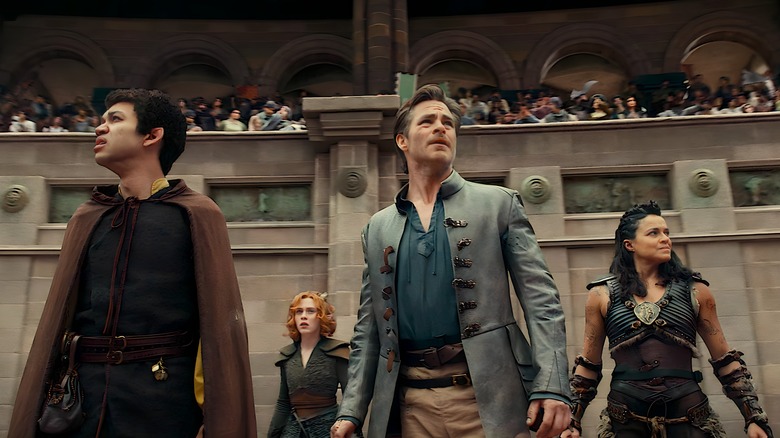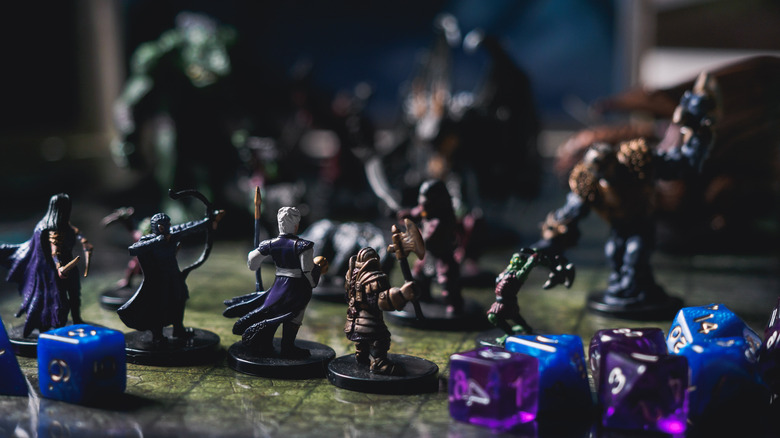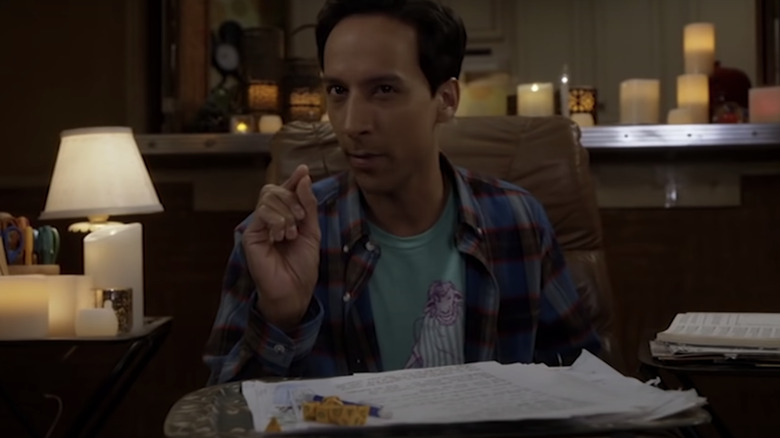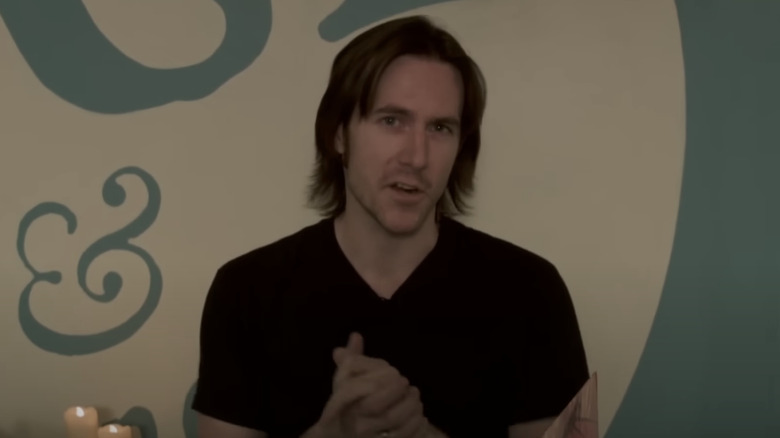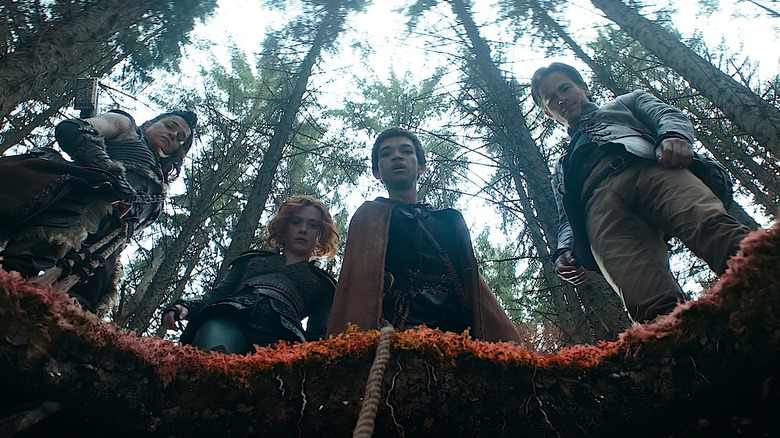Dungeons And Dragons: HAT Owes Its Success To Critical Role And Other Role Playing Streams
"No experience necessary."
That phrase, in a scratchy, attractively dangerous-looking font, has been scrawled on only a handful of posters for Paramount Pictures and Entertainment One's "Dungeons and Dragons: Honor Among Thieves." Why it isn't the film's defacto tagline, emboldened on every possible piece of marketing, is slightly perplexing, considering its subtle elegance.
The tagline works on two levels. First, it humorously paints a picture of the film's core ensemble — a rag-tag group of haphazard would-be world-savers as overconfident as they are underqualified. But second, and most importantly, it tells the audience something crucial to the film's box-office success: You don't need to be a D&D player to enjoy "Honor Among Thieves." Though we may all universally be in love with the national treasure that is Chris Pine, we're not all acquainted with the historically (and often deliberately) mystified world of table-top role-playing games.
Some of us wrongfully believed a culture that dismissed them as lame geeky relics of '80s culture, rather than cool geeky relics of '80s culture upon which modern popular culture has built its present collective identity. Some of us were gatekept by toxic fans wielding shields of esoteric lore and impossible standards.
The fact that a "Dungeons and Dragons" film was even greenlit, much less released to a generally positive reception, is slightly astounding when taking into account its relatively recent obscurity. Some may attribute its resurgence to "Stranger Things," but not even that Netflix behemoth could have paved the way for this alone. For a successful, earnest film adaptation of this previously derided property, we have live-play streamers to thank.
To most people, D&D used to be just a game
Though ignorance and gatekeeping were certainly huge barriers to entry for many would-be dungeon dwellers, arguably the biggest issue was the boring business of brand education. Think about this for a moment: How would you describe D&D to someone who had never played it before? Could you do it in a sentence?
To the uninitiated, D&D seems like a game. For some folks, it likely shares mental space with properties like the video game "Skyrim" or the card game "Magic: The Gathering." The appeal of it, then, would be learning all the different strategies, lore, spells, etc. to battle against others or complete quests. If you're someone who's into intense gameplay, that sounds like heaven. If you're not, it sounds like a nightmare to be avoided.
While the gameplay is certainly a huge part of the experience, for at least some players it doesn't exist without the game's most attractive trait for those that wouldn't normally categorize themselves as "gamers" on any level. As many now know, D&D is more than a game — it's a platform for communal storytelling.
Non-players needed to understand the capacity for storytelling and interaction
In 2011, a Season 2 episode of the cult classic NBC series "Community" painted D&D as a form of player-generated storytelling for a wide audience. Instead of focusing on dice roles and statistics, the story focused on, well, the story. One of the characters even tries to win by studying various game books, only to be thwarted by an imaginative group strategy based entirely on narrative and player interaction. The episode demonstrated this so well, in fact, that the characters again played D&D in a Season 5 episode full of imaginative storytelling and in-depth (and emotionally over-the-top) role-play.
Those two aspects of the game make it attractive to a much more diverse group of people. There are those out there who can't tell their "Dark Souls" from their "Demon Souls," but would jump at the chance to attend a murder mystery party. Is this to say that the key to making a "Dungeons and Dragons" movie was to force the world to realize that we are all embarrassing theater kids at heart?
No, not exactly. "Community" proved that "Dungeons and Dragons" was as much about story as it was gameplay, but through the vessel of an already established TV show, its potential as an entertainment medium was yet undiscovered.
Live-play streams proved that people would actually watch a D&D game for fun
Because of the success of roleplaying streams like "Critical Role," it became a concrete fact that you didn't even need to play "Dungeons and Dragons" to be a fan of "Dungeons and Dragons." Say you're a shy introvert who dreads texting people and likes watching TV more than you like going to a murder mystery party. Boom, now you can be a D&D fanatic without having to leave the house or respond to the 267 unread messages on your phone, simply by watching.
The conception of this voyeuristic variation of D&D enthusiasts both creates an audience for non-playable entertainment projects like shows and movies, and illuminates why they can exist in the first place. Perhaps unintentionally, the world of D&D is enjoyably chaotic due to its necessity to be both infinitely malleable and somewhat luck-based. Actions have arbitrary ranges, scopes, and cooldown times, and some spells are designed to have deliberately unpredictable effects. A bad dice role can have an impact on combat damage, sure, but it can also make you blurt out the wrong thing to that elf you're trying to seduce for information.
If it weren't for these live-play sessions that actively embraced and rolled with that chaos, D&D wouldn't have been able to flex its surprisingly unique world and tone to thousands of new fans, most of whom likely raced to the theater to see "Honor Among Thieves" during its opening weekend. They didn't just create an audience for D&D content; they created the concept of a D&D audience entirely.
Honor Among Thieves is basically a high-budget live-play campaign
By creating an audience for D&D, people had a concept of what they would actually want from a D&D story. No one showed up to streams to hear heaps of gritty lore or to watch over-serious players attempt to recreate "Lord of the Rings." They wanted to see charismatic people earnestly trying to make their way through the bizarre fantasy world of "Dungeons and Dragons," which is exactly what "Honor Among Thieves" depicts in its finest moments.
It isn't trying to be a grimdark fantasy adventure or a quippy fantasy-lite tale targeted toward newcomers. Like the streams, and like players around the world in games private and public, it simply tries to tell a story with the rules it's given. It doesn't take itself too seriously, but it doesn't shy away from the ground it treads on.
The film and the live-play streams are miraculously on the same page as the players, for the most part, and that simply wouldn't have happened without years of gradual education from longtime champions of the game. If Hollywood continued to have its own, isolated idea of what D&D was, we likely would've received another film like 2000's "Dungeons and Dragons" — a frightened work of self-consciousness and doubt.
